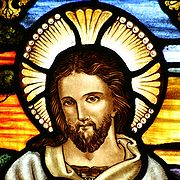- Christian tradition
-
Christian tradition is a collection of traditions of practices or beliefs associated with Christianity or groups with Christianity. These beliefs have more or less authority based on the group in question.
Many churches have traditional practices, such as particular patterns of worship or rites, that developed over time. Deviations from such patterns are sometimes considered unacceptable or heretical. Similarly, traditions can be stories or history that are or were widely accepted without being part of Christian doctrine, e.g., the crucifixion of Saint Peter, which is widely believed to have happened but is not recorded in scripture. Similarly the names of the Magi who visited Jesus at his birth are thought to have been invented much later than the events; they are not now considered authentic, but can be considered a tradition.
Tradition also includes historic teaching of the recognized church authorities, such as Church Councils and ecclesiastical officials (e.g., the Pope, Patriarch of Constantinople, Archbishop of Canterbury, etc.), and includes the teaching of significant individuals like the Church Fathers, the Protestant Reformers, and founders of movements like John Wesley. Many creeds, confessions of faith, and catechisms generated by these bodies and individuals are also part of the traditions of various bodies.
Branches
Among the main groups of Christianity, there are Catholics, Orthodox, and Protestants. In the Roman Catholic Church and Eastern Orthodox churches, Sacred Tradition is considered official doctrine and of equal authoritative weight to the Bible. Among conservative Protestants, the Bible itself is the only final authority (see sola scriptura and prima scriptura), but tradition still plays an important supporting role. All three groups generally accept the traditional developments on the doctrine of the Trinity, for instance, and set bounds of orthodoxy and heresy based on that tradition. They also have developed creedal and confessional statements which summarize and develop their understanding of biblical teaching.
References
- Baum, Wilhelm; Winkler, Dietmar W. (2003). The Church of the East: a concise history. Routledge. ISBN 9780415297707.
Part of a series on Christianity Jesus Christ 
Foundations Bible Theology Apologetics · Baptism · Christology · God · Father · Son · Holy Spirit · History of theology · Mary · Salvation · TrinityHistory and
traditionChurch Fathers · Early Christianity · Constantine · Ecumenical councils · Creeds ·
Missions · East–West Schism · Crusades · Protestant Reformation · ProtestantismDenominations
(List) and
MovementsWestern: Adventist · Anabaptist · Anglican · Baptist · Calvinism · Evangelical · Holiness ·
Independent Catholic · Lutheran · Methodist · Old Catholic · Pentecostal · Quaker · Roman Catholic
Eastern: Eastern Orthodox · Eastern Catholic · Oriental Orthodox (Miaphysite) · Assyrian
Nontrinitarian: Christadelphian · Jehovah's Witness · Latter Day Saint · Oneness Pentecostal · UnitarianTopics Art · Criticism · Ecumenism · Liturgical year · Liturgy · Music · Other religions · Prayer · Sermons · SymbolismCategories:- Christian theology
- Christian terms
Wikimedia Foundation. 2010.

